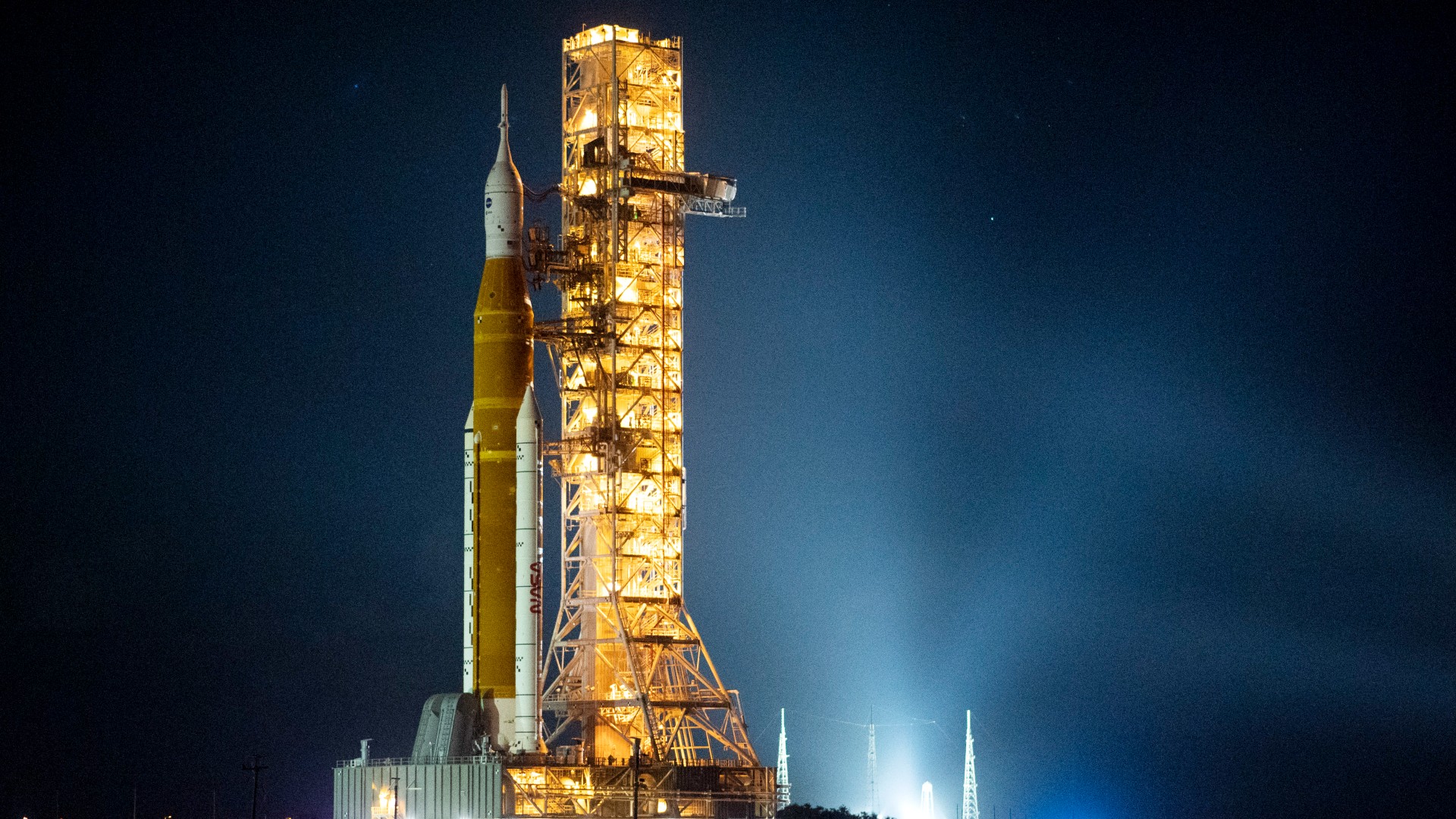NASA's Artemis 1 moon rocket boosters could expire in December, launch or not
Even rockets have expiration dates.

As the launch date for NASA's Artemis 1 moon mission continues to get pushed back due to glitches and storms, a deadline for its solid rocket boosters is quickly approaching.
The launch of Artemis 1 — which will use a Space Launch System (SLS) rocket, aided by two boosters, to send an uncrewed Orion capsule to the moon — was once again delayed, this time until no earlier than Wednesday (Nov. 16) due to the impending arrival of Tropical Storm Nicole on Florida's Space Coast. Satellite images show Nicole currently looming in the Atlantic Ocean next to NASA's Kennedy Space Center (KSC), generating wind speeds up to 70 mph (110 kph) as it closes in on the center's Launch Pad 39B, where the Artemis 1 stack sits, ready to ride out the storm.
Now that the Artemis 1 moon mission has been delayed once again, there are concerns that some of its hardware may expire prior to launch. For example, several key deadlines concerning the mission's two solid rocket boosters, built by Northrop Grumman, are approaching. If Artemis 1 has not launched by mid-December, NASA will have to analyze the boosters to see if they are still launch-worthy past their current expiration dates.
Related: NASA delays Artemis 1 moon launch to Nov. 16 due to Tropical Storm Nicole
During a media briefing on Nov. 3, NASA officials told reporters that several components of the SLS vehicle's boosters are approaching their current expiration dates, based on the most recent analyses that team members have conducted.
Cliff Lanham, senior vehicle operations manager of the Exploration Ground Systems Program at KSC, told reporters that a countdown begins as soon as a rocket is stacked. That countdown is currently ticking down for the Artemis 1 vehicle.
"When you stack your first segment on the aft segment, you start a clock that was originally 12 months," Lanhan said. "It's currently been analyzed up to 23 months, and that expires. One piece expires on the ninth of December of this year, and the other one is the 14th of December of this year."
Breaking space news, the latest updates on rocket launches, skywatching events and more!
Another environmental exposure rating expires on Dec. 15, he added.
If Artemis 1has not launched by those dates, the mission team would have to conduct further analyses to determine if the expiration dates on the rocket's various components could be extended, said Jim Free, associate administrator of the Exploration Systems Development Mission Directorate at NASA headquarters in Washington, D.C.
"Each of them has a different revisit date — that's my term — when we have to go back and redo the analysis and look at the assumptions in the analysis. And it's really more a function of when do we feel like those assumptions are no longer good and the boosters fall into that category," Free said during the Nov. 3 media briefing. "I think I would be doing our team and you a disservice by saying we can just go forever, because I don't think that's the case. I think we look at the analysis every time with a different set of lenses thinking about what else could have changed."
NASA is currently eyeing a two-hour window for the launch of Artemis 1 opening at 1:04 a.m. EST (0604 GMT) on Wednesday (Nov. 16). If successful, the launch will send an uncrewed Orion capsule into lunar orbit and back. The launch will be the first mission of the Artemis program which will eventually see humans return to the moon near the lunar south pole in 2025 or 2026, with the ultimate goal of establishing a permanent base on the moon.
Follow Brett on Twitter at @bretttingley. Follow us on Twitter @Spacedotcom or on Facebook.

Brett is curious about emerging aerospace technologies, alternative launch concepts, military space developments and uncrewed aircraft systems. Brett's work has appeared on Scientific American, The War Zone, Popular Science, the History Channel, Science Discovery and more. Brett has degrees from Clemson University and the University of North Carolina at Charlotte. In his free time, Brett enjoys skywatching throughout the dark skies of the Appalachian mountains.
